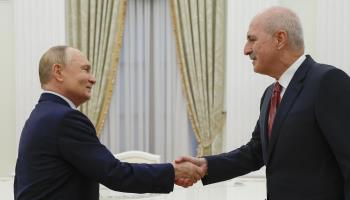The fall of the Assad government in Syria has generated tensions between Russia and Turkey
On January 13, Kremlin Spokesperson Dmitry Peskov accused Ukraine of attacking the TurkStream gas pipeline passing through the Black Sea and Turkey. According to Peskov, Foreign Minister Sergey Lavrov and Gazprom head Alexei Miller discussed the incident with Turkish officials. The downfall of the Assad government in Syria and the termination of gas transit through Ukraine have increased Turkey’s leverage over Russia.
What next
Russia’s influence in Syria and the broader region will shrink further, to Turkey’s advantage. However, President Recep Tayyip Erdogan will continue to engage with President Vladimir Putin on issues where interests overlap. He will aim to become an intermediary in the forthcoming ceasefire talks between Russia and Ukraine. As Turkey’s gas contracts with Russia are up for renegotiation in 2025-26, Ankara will drive a hard bargain to exact better terms from Moscow.
Subsidiary Impacts
- A ceasefire in Ukraine would raise the prospect of reopening the Black Sea to military ships from outside the region.
- Russia may try to undermine the ongoing effort to normalise Turkish-Armenian ties.
- Trade turnover between Russia and Turkey may decline further.
Analysis
Russia and Turkey are both competitors and partners. To check Russian expansion in the Black Sea, Turkey has provided military support to Ukraine, and it is aligned with Syrian militias that ousted President Bashar al-Assad, Moscow’s key ally in the Middle East (see TURKEY: Ankara will look to shape post-Assad Syria – December 19, 2024). At the same time, Turkey has roundly refused to join Western sanctions, with Russia supplying about 40% of Turkey’s gas and over 70% of its crude oil.
70%
Russia’s share of Turkish crude oil imports
Syria
Starting in 2015, Russia’s intervention thwarted the Turkish push against Assad. Faced with economic pressure from Moscow, Erdogan opted for a compromise with Putin. It was only with Moscow’s blessing that Turkey managed to take over parts of Syria and create a buffer against the Kurdish-dominated Syrian Democratic Forces (SDF).
Assad’s unexpected downfall has fundamentally changed the dynamics. Moscow has withdrawn its troops to the two bases in the Latakia province, the future of which remains uncertain (see RUSSIA: Moscow will negotiate with new Syrian leaders – December 13, 2024).
The new Syrian leader, Ahmed al-Sharaa, has welcomed Turkey as a key regional partner. Ankara’s relationship with Hayat Tahrir al-Sham (HTS), Sharaa’s Islamist force, is long-standing, although not always problem-free. In early 2020, Turkish military intervention halted an offensive by Assad and Russia aimed at conquering the HTS-run enclave around Idlib.
Turkey will profit if the Russian contingent withdraws from Syria. However, unlike the EU, Ankara has not been vocal about the issue and still envisages a role for Moscow. Turkish Foreign Minister Hakan Fidan discussed the political transition in Damascus with Lavrov on January 12.
Turkish-US ties
Turkey sees an opportunity in Donald Trump’s new presidency. It is keen to push the SDF from all areas along the border with Syria, which hinges on the United States, the Kurdish militants’ main partner, withdrawing its forces. As Russian troops moved out from the regions in question in December, Moscow ceased to play a part in Erdogan’s calculus.
Ankara has also been working on a compromise over the S-400 air defence systems acquired from Russia in 2019. Erdogan and Trump might cut a deal to transfer the systems to the US military stationed at the Incirlik base. In exchange, the United States could readmit Turkey into the F-35 consortium, an outcome that would severely dent Russian-Turkish defence ties.
US pressure has already contributed to the reduction of commercial ties between Turkey and Russia (see RUSSIA: Limits to ties with Turkey will persist – April 16, 2024). Fearful of secondary sanctions, Turkish banks have tightened restrictions on Russian individuals and companies holding accounts and processing payments. Turkey has reportedly imposed a ban on direct sales of “battleground goods”, including microchips, resulting in a drop of Turkish exports by around one-quarter in 2024, although some of the goods in question might have been redirected through intermediaries such as Azerbaijan and Kazakhstan.
Ukraine
In his New Year’s address, Erdogan said ending the war in Ukraine “with a just peace” remains his priority. Having hosted talks at the outset of the Russian invasion in the spring of 2022, Turkey sees itself as a potential mediator in a fresh round now that the Trump administration has assumed office. However, other countries are bidding for the same role, including Serbia and EU member Slovakia, whose Prime Minister Robert Fico visited Moscow in December.
Erdogan proposed a peace summit back in March 2024, during a visit by Ukrainian President Volodymyr Zelensky.
Turkey will likely push to play an important role in any negotiations between Russia and Ukraine
Ceasefire talks would likely see Russia requesting Turkey re-open the Straits for naval ships not registered as part of its Black Sea Fleet. Ankara closed the Bosphorus and the Dardanelles in 2022, in line with the Montreux Convention.
Because the fleet suffered substantial losses due to Ukrainian strikes, Russia would be interested in sending reinforcements (see RUSSIA: Black Sea Fleet is not yet defeated – April 25, 2024).
As a result, Turkey will probably not rush to make a decision. Opening the Straits would enable non-Black Sea NATO members to resume their naval presence, another reason Ankara might wish to delay.
Energy ties
With the expiry of the transit contract between Gazprom and Ukraine’s Naftogaz at the end of 2024, Turkey remains the sole export route for Russian pipeline gas to Europe (see RUSSIA: Gas payment will be easier for European buyers – December 6, 2024). TurkStream currently ships around 15.75 billion cubic meters (bcm) to customers such as Hungary and Serbia, although volumes may increase.
Thanks to a contract with Bulgaria, Turkey’s state utility BOTAS has access to the currently disused Trans-Balkan Pipeline, which TurkStream replaced. It could pump Russian gas to Moldova via Bulgarian and Romanian territory, but a change in the point of delivery is contingent on negotiations between Moscow and Chisinau (see MOLDOVA: Energy crisis will worsen – January 7, 2025).
Additional volumes of Russian gas could reach European customers via Azerbaijan and Turkey. Baku is in a position to mix gas from the Shah Deniz field, connected to the Trans-Anatolia Pipeline (TANAP) and its extension, the Trans-Adriatic Pipeline (TAP), with imports from Russia.
Turkey will exploit its role as a principal transit country to negotiate better terms with Gazprom. The supply contract linked to the Blue Stream pipeline, delivering 16 bcm annually through the Black Sea, expires at the end of this year. Another 5.75-bcm deal covering TurkStream will lapse in 2026.
In addition, Turkey will continue to import substantial volumes of Russian crude oil, which it refines and markets to customers in the EU. Turkey is the world’s leading buyer of Russian diesel and gasoil. Last year, supplies from Russia increased by one-quarter from 2023, to 16.8 million tonnes.
Armenia
Turkey benefits from Armenia’s turn to the West, a consequence of the 2023 loss of Nagorno-Karabakh to Azerbaijan (see ARMENIA: Yerevan will continue with balancing act – September 6, 2024).
The security partnership agreement signed between the United States and Armenia as well as Yerevan’s decision to freeze participation in the Russia-led Collective Security Treaty Organisation put Russian military presence at the Armenian-Turkish border in question (see ARMENIA: US agreement signals search for new allies – January 15, 2025).
Reduced Russian influence limits Moscow’s capacity to act as a spoiler in the ongoing negotiations between Ankara and Yerevan on normalising ties and re-opening the border.



